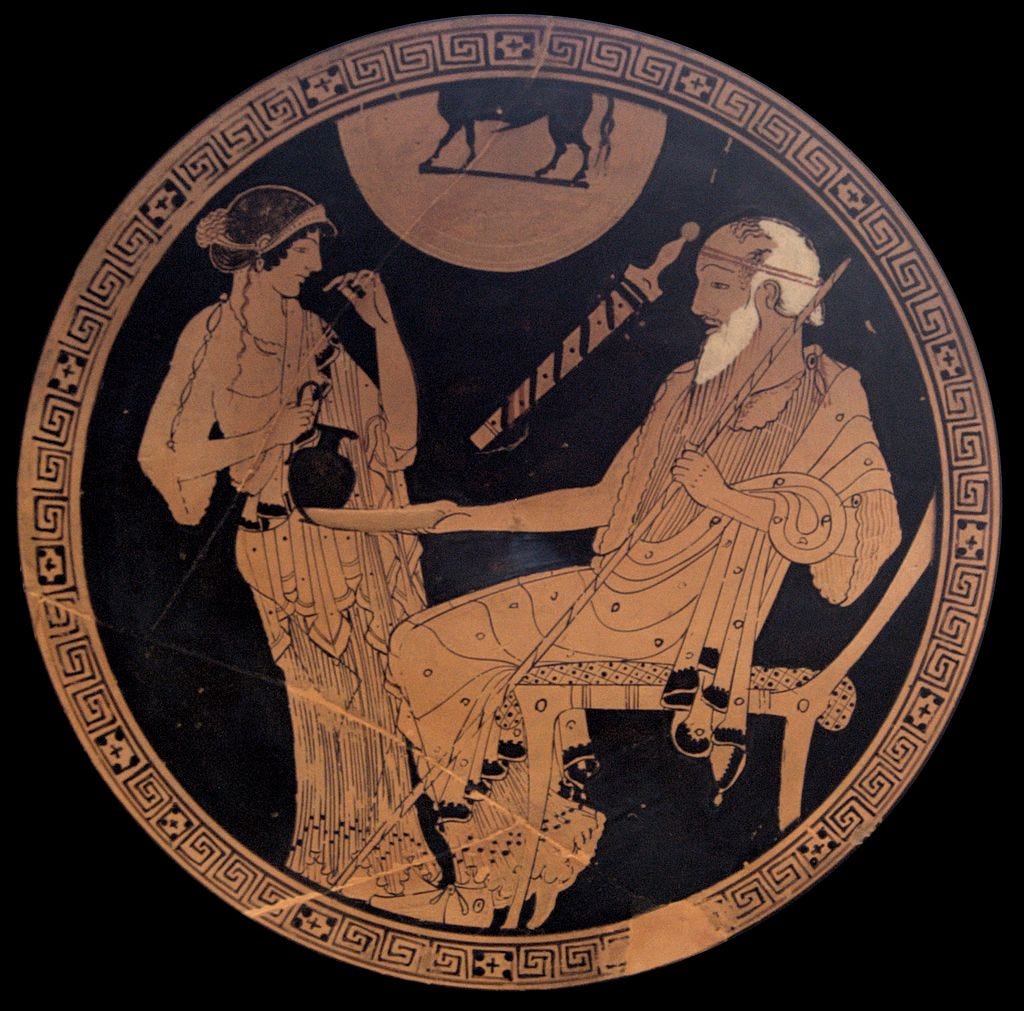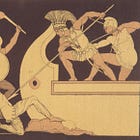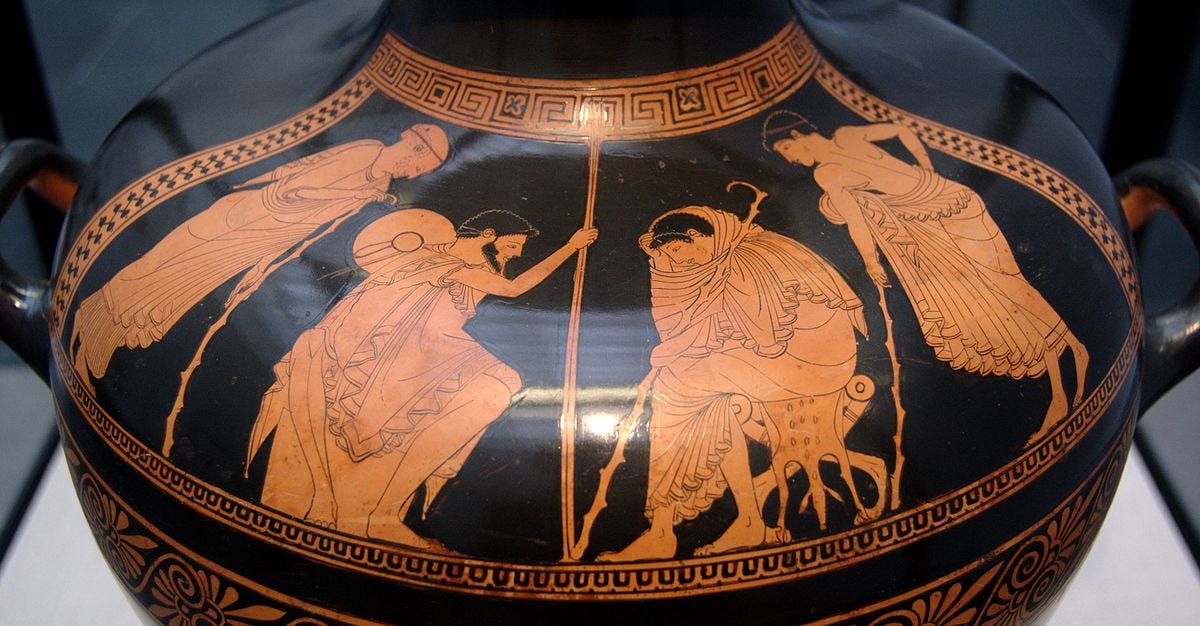The Embassy to Achilles
The Iliad Book 9
Exploring Life and Literature.
*Regular newsletters appear on Tuesdays. The Deep Reads Book Club newsletters appear on Fridays. You can find all the book club details at the link below.*
I hate that man like the very Gates of Death who says one thing but hides another in his heart.
Dear friends,
The tension between free will and fate reverberates through The Iliad, and nowhere is this struggle more evident than in Book 9, The Embassy to Achilles. Here, we witness the raw interplay between human agency and divine preordination as Agamemnon, the leader of the Achaeans, attempts to persuade Achilles, their most formidable warrior, to return to battle against the Trojans. Achilles’ response to this entreaty is not merely an act of personal pride or stubborn defiance—it is a meditation on the limits of human control in a world governed by fate. This episode is pivotal to the plot and rich with insights applicable to the modern struggle between individual agency and predetermined circumstances.
As Book 9 unfolds, the Achaean army is in dire straits. Hector and the Trojans, emboldened by divine favor and the absence of Achilles from the battlefield, have pushed the Greeks back to their ships. Recognizing their peril, Agamemnon gathers his war council, admitting that he has made a grave mistake in dishonoring Achilles. In an effort to repair the damage, he proposes a lavish offering: a treasure trove of gifts, the return of Briseis, and the promise of further rewards should Achilles return to battle. However, Achilles remains unmoved despite the material wealth and honor Agamemnon places before him. This moment encapsulates a recurring theme in Greek literature—the question of whether personal fate can be altered by human decision-making or whether destiny is immutable.
The embassy to Achilles is comprised of three influential figures: Odysseus, Phoenix, and Ajax. Each attempts to persuade Achilles in a different way. Odysseus, always the wily orator, presents Agamemnon’s offer in its most compelling terms, emphasizing the immense wealth and honor that will be bestowed upon Achilles. He appeals to reason, suggesting that personal grievances should be set aside in the face of a greater duty. But Achilles, who has already foreseen his own fate, dismisses these material incentives. He articulates a philosophy that challenges the Greek warrior ethos: What is the point of all this fighting, all this suffering, if it only leads to an early death?
Achilles’ response highlights one of the fundamental conflicts in The Iliad: the choice between a short, glorious life and a long, obscure existence. He understands that returning to battle will bring him eternal fame but at the cost of his life. For the first time, we see Achilles asserting his own will against a fate that seems preordained. In a striking departure from heroic convention, he suggests abandoning the war altogether, contemplating a return to Phthia where he might live a quiet life. This moment is significant because it underscores the possibility—however fleeting—that Achilles may be able to forge his own destiny.
The second appeal comes from Phoenix, Achilles’ old tutor and father figure, who shifts the argument from personal gain to duty and legacy. He reminds Achilles of the story of Meleager, a warrior who, like Achilles, refused to fight until it was too late. His tale serves as a cautionary lesson: by the time Meleager finally chose to rejoin the battle, the rewards once offered to him were no longer available. Phoenix’s plea is deeply emotional, rooted in personal bonds rather than material enticement. Yet Achilles, though clearly affected, remains resolute. His response is a masterful blend of logic and sentiment—he respects Phoenix but refuses to yield to the pressure of obligation alone.

Finally, Ajax, the most straightforward of the three emissaries, grows frustrated and chastises Achilles for his obstinacy. He speaks as a soldier, not a diplomat, and his blunt approach cuts through the rhetoric. He reminds Achilles that his comrades are suffering and that his anger should not come before the lives of his fellow warriors. This argument momentarily shakes Achilles, but even in his wavering, he maintains that he will not return to the battlefield unless Hector himself threatens his own ships. This stipulation leaves the door open for Achilles’ eventual return but makes it clear that he will do so only on his own terms.
This episode is one of the most human moments in The Iliad, where the grand forces of war, honor, and fate are distilled into an intimate conversation. Achilles is not merely a warrior deciding whether to fight; he is a man wrestling with the weight of destiny. His internal battle—between duty and personal agency—mirrors a universal human experience. How much control do we truly have over our lives? Can we ever truly escape the roles we are given?
In a modern context, this dilemma resonates profoundly. Today, individuals frequently struggle between societal expectations and personal desires. Career paths, family obligations, and cultural norms often impose a framework within which people must navigate their choices. Achilles’ predicament is not so different from a person debating whether to follow a predetermined career track for security or to pursue a passion that may lead to an uncertain future. His defiance of fate—his insistence that he might leave for Phthia—mirrors the impulse to rebel against structures that seem inescapable.
Additionally, Achilles’ rejection of Agamemnon’s gifts speaks to the modern disillusionment with material wealth as a solution to deeper issues. His refusal suggests that no amount of gold or prestige can compensate for a fundamental loss of self-respect and agency. This sentiment is particularly relevant in an era where personal fulfillment is often at odds with financial security and social approval.
Ultimately, Book 9 of The Iliad is more than a pivotal chapter in the Trojan War; it is a meditation on choice, destiny, and the limits of persuasion. Achilles’ decision to remain withdrawn from battle, despite the efforts of the embassy, challenges the notion that honor and duty are absolute. Instead, it presents a vision of heroism that is deeply personal, rooted in self-awareness rather than blind adherence to tradition.
Even as fate looms over him, Achilles asserts his will in the only way he can—by choosing when and how he will act. In doing so, he offers us a timeless lesson: while destiny may shape our circumstances, how we respond remains within our control.
“I made you what you are, my splendid Achilles; loved you from my heart. You would not eat unless I set you on my knees and fed you, chewed the food and held the wine up to your lips.”

Warriors and kings populate the world of Homer’s The Iliad, each playing their part in the grand tapestry of the Trojan War. Among them is Phoenix, an aged but steadfast warrior whose story is not one of mere combat but of mentorship, loyalty, and persuasion. He is a figure who bridges generations, bound to both the past and the present through his deep ties to Achilles, the greatest of the Greek warriors. Phoenix’s presence in The Iliad is brief but profound, for he serves as one of the key emissaries in Book 9 when the Greek war effort hangs in precarious balance. His role as Achilles’ former guardian and his subsequent appeal for the hero’s return to battle offer readers an intimate glimpse into the complex interplay of honor, duty, and personal affection that underpins Homeric heroism.
Phoenix’s backstory is one of familial betrayal and eventual redemption. Born to the king Amyntor of Hellas, Phoenix suffered the misfortune of his father’s wrath. According to his own account, his father wronged his mother, and in return, she implored Phoenix to seduce a concubine whom Amyntor favored. Whether out of duty to his mother or resentment toward his father, Phoenix complied, and the resulting discord led Amyntor to curse him, praying that he would remain childless forever. This curse carries weight in the context of The Iliad, where legacy and progeny are central to a hero’s immortality.
Shunned and outcast, Phoenix sought refuge with King Peleus, the father of Achilles. Here, he found not only a protector but a new purpose. Entrusted with the upbringing of Peleus’s son, Phoenix assumed the dual roles of mentor and surrogate father. He trained Achilles in the ways of war and wisdom, a responsibility he did not take lightly. In doing so, Phoenix became more than a mere tutor—he became a deeply trusted advisor and a voice of reason in Achilles’ life.
Phoenix’s primary significance in The Iliad comes during the critical embassy scene. While Odysseus presents a pragmatic appeal based on material rewards, and Ajax follows with a blunt appeal to camaraderie, Phoenix takes a different approach. His plea is emotional and deeply personal, evoking their shared history and the love he bears for Achilles. He reminds the young warrior of the nurturing care he provided, describing how he raised him like a father would his own son.
Phoenix has a unique role among Achilles’ inner circle. He is not merely an ally but a father figure, appealing not to Achilles’ desire for glory but to his capacity for human connection. Furthermore, Phoenix invokes the myth of Meleager, a warrior whose stubborn wrath led to suffering for his people—a cautionary tale to convince Achilles to relent before it is too late.
Despite the depth of his plea, Achilles remains unmoved. His resolve to resist Agamemnon’s overtures is unwavering, and while he offers Phoenix the option to stay with him, he does not yield to his mentor’s argument. The moment is poignant, illustrating the limits of persuasion and the tragic inevitability of Achilles’ fate.
Phoenix is not a warrior of renown like Achilles or Hector, nor a wily strategist like Odysseus, but his role in The Iliad is indispensable. His presence adds emotional weight to the narrative, demonstrating the powerful bonds beyond the battlefield. He is a living reminder of Achilles’ past and a symbol of the values that once tethered the young warrior to the Greek cause.
Phoenix’s speech also illustrates one of the epic’s central themes: the tension between personal honor and collective duty. Achilles’ refusal to return to battle, despite Phoenix’s heartfelt appeal, underscores his rigid adherence to his own sense of justice, even at the cost of his comrades’ suffering. The tragedy of Phoenix is that he represents wisdom and diplomacy in a world dominated by force and wrath—he is the voice of reason in a conflict where emotions often override prudence.
In the grand narrative of The Iliad, Phoenix stands as a poignant figure of loyalty and devotion. His journey from exile to redemption, his role as Achilles’ guardian, and his passionate yet unsuccessful appeal in Book 9 deepen the epic’s emotional complexity. He embodies the voice of experience and reason, qualities that are often overshadowed in a story driven by youthful passion and divine intervention.
Although he does not shape the course of the Trojan War directly, Phoenix’s presence enriches The Iliad by providing a human counterpoint to the larger-than-life heroism that defines the epic. His relationship with Achilles underscores the themes of mentorship, love, and the limits of persuasion—elements that elevate The Iliad beyond a mere tale of war and into a meditation on the human condition. As such, Phoenix remains a figure of quiet but profound significance, a man whose words linger even when they fail to change the course of fate.
Here are a few questions to think about. Feel free to discuss these or any others that may be of interest.
What does Book 9 reveal about the theme of honor (timê) and glory (kleos) in Greek warrior culture? How does Achilles challenge these values?
Achilles tells Odysseus that he has two possible fates—either a long, quiet life or a short, glorious one. How does this prophecy shape his decisions in Book 9?
If you were in Achilles’ position, would you accept Agamemnon’s offer? Why or why not?
Reading Assignment for Next Week
We will cover Book 10. In the Fagles translation, this chapter is entitled Marauding Through the Night and covers pages 276-295. In the Wilson translation, it is called Espionage by Night and covers pages 223-244.
Beyond the Bookshelf is a reader-supported publication. If you are looking for ways to support Beyond the Bookshelf, please visit my support page and see the ways you can help continue the mission of exploring the connection between life and literature.
Until next time,
Previous articles in this series:
If you are a new subscriber or missed any of the previous articles in this series, you can catch up at the link below:
All opinions in this essay are my own unless otherwise noted. Additionally, I have highlighted all sources in the text if needed.









Agamemnon’s offer is irrelevant both for Achilles honour and his glory. If he has made his choice to die for glory (rather than live a long and quiet life) then the offer is meaningless - especially the promise of future benefits like an illustrious marriage and wealth. Achilles made that choice before his wrath at the beginning of the book. The only question remains is when will he re-enter the fray. If he is delaying entering the fray to prolong his life then he is doing it at the price of many lives of his friends and compatriots, including a father figure and ultimately his closest friend - this is neither honourable nor enhancing his glory as he continues to behave like a petulant child. His threat to sail off also appears dishonest given his earlier confirmed choice of death for glory.
I would have chosen a quiet long life but then I don’t claim to have semi divine status.
I see Achilles truly struggling to choose between the 2 fates available to him. Even though we have an inkling of what he will ultimately do, the power of the entreaties to him, particularly from Phoenix, make his struggles appear to be more than showmanship. I was particularly struck by the invitation to Phoenix to spend the night; that really seems to humanize Achilles.
The fact that Achilles has more than one fate available to him, in my mind, further complicates the theme of fate v. free will. If we have multiple fates available to us, and if we are able to choose among them, then does that mean team free will prevails? Or even if we have multiple fates available to us, they are not infinite and our choices remain limited, so is team fate dominant?
When Diomedes replies to Agammenon's order to sail back to Argos, he declares courage to be the greatest power of all, even greater than honor. (Fagles, line 44). Honor and glory are pervasive, elevated virtue in the Ilaid, but Diomedes' statement is intriguing. It suggests that courage, even if it doesn't result in honor or glory, is a superior virtue, but this doesn't necessarily seem to be the case among the Greek gods and in Homer's poems. Courage is important, but honor and glory see to take center stage most of the time. In modern times, most of us value courage, particularly self-sacrificing courage on behalf of others, as being the highest order of virtue, whereas honor and glory are just vanity.